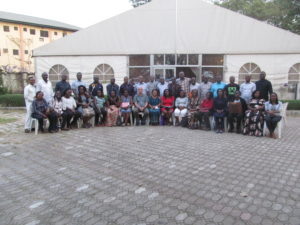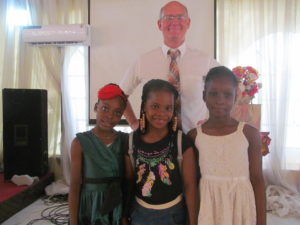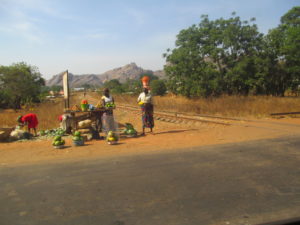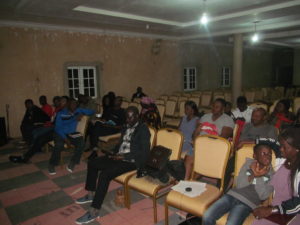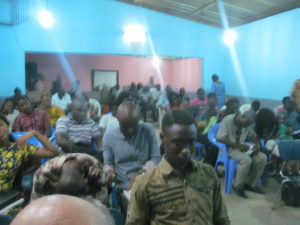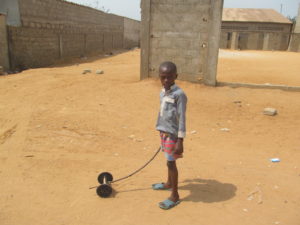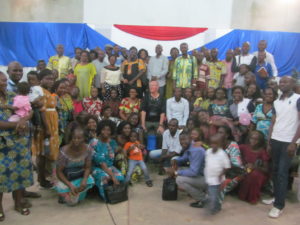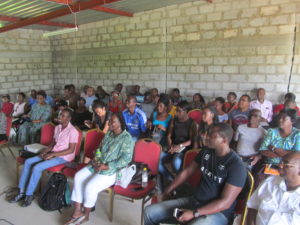Journal: Missionary Teaching Trip to Nigeria, Togo, Congo and Zambia
I am now on the last leg of my travels, in Lusaka, Zambia. Lessons are at the web site.
Africa 2019 Journal
Jan 3-10 Abuja Nigeria
I arrive in Abuja at 5:00 AM. Abuja is a city of five million. It is the second city of Nigeria and is the political capital. It is a sort of artificial city, as it was carved out of countryside beginning in the early 80s as a brand new city. This was done so as to create an alternative to Lagos, the financial capital of Nigeria. This was probably a good idea for a few reasons. First, Lagos is a massive city and is very chaotic. Second, Lagos is in the southwest corner of the country and a more central capital like Abuja is a wise idea. A key thing about Nigeria has to be kept in mind at all times. This is not a united country, religiously. The north of the country is predominantly Hausa in culture and language and Muslim in religion. The south of the country is predominantly Yoruba and Ibo in culture and language and Christian in religion. Abuja lies near the divide between the two and therefore it is a religiously divided city. The two do not mix well here in Nigeria.
I am met by Shadrach Obasa. He and his wife lead a family of five churches here in the central and northern parts of Nigeria. We have been friends for fifteen years, since my first visit to Lagos. The church here in Abuja is about 230. It has grown much since my first visit twelve years ago with my daughter Kate. Most of the churches in this part of Nigeria have been growing. Because Abuja is a more prosperous city, the church is financially stable and able to support a few plantings. They recently hired a campus minister. Other groups include Kiduna, Jos and more. Nigeria has 180 million plus inhabitants. It is the most populous country in Africa. Imagine a country about 25% larger than Texas with 180 million people. Now you begin to get Nigeria.
My main work here is as a teacher for the annual leadership conference in Northern Nigeria. There are about fifty men and women here, desiring to be more effective leaders for the church in this dangerous part of Nigeria. I visit the site where the church meets. There are threats painted on all of the buildings by Muslim radicals, warning the church to leave within 24 hours or else…. The church had to put up barriers, hire permanent security and have armed guards at all of their meetings. On Friday I teach an eight hour class on the Book of Revelation. This is a very religious country. There is a church on every corner, and two or three on some corners. However, most of the churches here teach the prosperity gospel. Believers also hear many false teaching about end-times, making a class on Revelation important. Teaching about remaining faithful despite persecution is particularly relevant here as well.
Worship in Nigeria is very lively. Singing involves dancing and many drums. It is hard to explain the level of emotion in the worship. It makes the kind of worship I am used to seem almost boring by comparison.
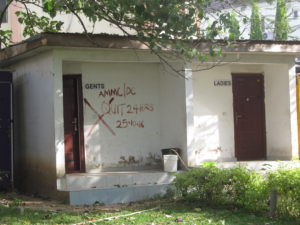 Muslim threats against the church.
Muslim threats against the church.
On Saturday, I teach a class on Daniel for the leadership conference. The context of the book is the Jews suffering terrible persecutions under Antiochus Epiphanes. This seems more relevant here where there is so much persecution of the church. In the evening I get to spend time with the leaders from the various churches in central Nigeria who came to the conference. The faith of these men and women is a great inspiration to me. In the evening I meet with the leaders of the satellite churches: Ibieneye and Ebunoluwa Taylor Harry from Kaduna, Tunde and Josee Omiwole from Jos, Antony and Juliette Echimie from Lokoja and Ayodeji Akure from Olahenka. They have so many questions about how to help their small churches. I ask what they need from us. The answer is that they need for shepherds or elders to visit their churches, they need books, as their members love to read and they have almost no material and they need financial support. If anyone reading this can help with one of these needs, please consider coming to Nigeria or helping someone else to do so.
Sunday, of course, is church. There are over 250 in attendance. Worship here is so dynamic, including a dance line all around the building. After a sermon on Hebrews 11, the Bible group leaders stay for a lesson on Freedom in Christ. Five hours after church started, the place is still busy. They really love fellowshipping here.
Jan 7-8 Jos, Nigeria
The journey to Jos is five hours by car on pretty questionable roads. Jos is to the Northeast from Abuja, on the Nigerian plateau. It is at about 4000 feet, so the weather here is quite pleasant, getting into the upper fifties at night and about eighty during the day. The population of this city is 1.5 million. Jos is right on the dividing line between Muslim and Christian Nigeria, which makes this a place of great conflict. Formerly, it was mainly Christian and Animist, but Muslims have pushed in in the last 30 years or so, setting up repeated rounds of bloodshed, with brutal massacres being not uncommon. Fault lies on both sides. While traveling here and while in the city I have an armed soldier at all times, as it is not safe for Westerners here.
Countryside scene near Jos
The church here has thirty-plus members. It is led by Tunde and Josee Omiwole. Fortunately, for such a small group, they are able to have full time leadership. They have great vision for the work of God here. On Monday evening I give a lesson from Acts 20 on Paul’s commission to the Ephesian elders to the leadership group. They have so many questions, as the amount of Bible teaching here is not great. I am so proud of this group for taking a stand for Jesus in this city where this is not a very safe thing to do.
Church in Jos
On Tuesday I tour the city a bit, visiting an animal park which is really a zoo and a cultural museum. In talking with Tunde I learn of a brother in a northern city who is the head of police in a state in the far north of Nigeria. This is the center of gravity of the troubles with Boko Haram. He has been sharing his faith there and now has twenty-two studying the Bible, many of whom are close to becoming Christians. How amazing is that? Unfortunately, he is being transferred to a different post, so the church here is trying to figure out how to take care of the nascent church there. In the evening I teach for the church here on From Shadow to Reality. There are about thirty in attendance, including a couple of visitors. Church starts at 5:30 because it is not safe to be on the streets after 8:00, so midweek needs to end by about 7:15. Tomorrow we return to Abuja.
Lome, Togo Jan 11-14
I fly to Lome, the capital of Togo on Thursday morning. Togo is a small country, very narrow east-to-west, but several hundred miles north-to-south. It is a country of seven million, with Lome having a population of 1.5 million. The entire country has a population about one third that of the city of Lagos. Togo, like its neighbor, Benin, is a French-speaking country. When I arrive I am surprised to see that the traffic is not bad at all and the roads are in very good condition. This is a change from Nigeria. Actually, only the main roads are paved, and most are dirt, but the paved roads are well-maintained, which is quite unusual in Africa. It is warm and humid here, compared to fairly cool and dry in Abuja.
The country is quite stable, although there is not real democracy, and the son inherited the presidency from his father. The streets are safe. Women feel comfortable walking alone at night and crime is very low. The people here are very laid back and just seem to enjoy life. The agriculture seems to be mostly subsistence farming and slash-and-burn in the countryside. This is a great country to visit if you can. Knowing French would help.
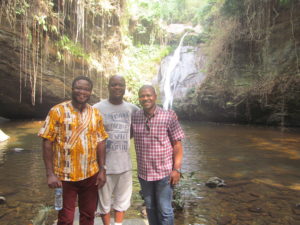 With friends as Wome waterfall.
With friends as Wome waterfall.
I am met by good friends Raymond Sannick and Gilbert Kimeng. Raymond leads the church of 102 members here in Lome. Gilbert was recently appointed a teacher in the Lagos church and is here, in part, to translate my lessons for a leadership retreat here in Lome. The leaders from four churches in Benin, plus the three churches our fellowship has in Togo will be at the meeting. I find that there is not a single English speaker here in all the churches here in Togo and Benin. I thought surely that there would be at least one. I am so thankful to Gilbert who is perfectly bilingual. Actually he is tetralingual, including German and his native language from near Bimenda in Cameroon.
On Thursday evening we have dinner at Raymond’s house, cooked by his wonderful wife. The food includes crabs in a very spicy sauce. Corn meal and, of course, bread are included. This is, after all, a French country. I get to meet leaders from Sokode in Togo and from Cotonou in Benin. There is also a church in Porto Novo in Benin and two others as well as another in Togo. Leaders from all of these churches are here for the conference in Lome.
On Friday we travel three hours north to Kpalime where we visit a beautiful waterfall in the mountains. This is a great adventure as we race oneanother up a very steep hill. I beat Raymond by a few seconds and Gilbert came in last. We hurry back to Lome for the first meeting of the leadership conference. There are about sixty in attendance when Raymond expected thirty or forty. What a great turnout. The singing, of course, is amazing and the prayers are very spirited. I teach for two hours from Acts with Gilbert translating.
Saturday is a full day of classes. These are open for the church and about eighty attend. I teach for three hours on Hebrews, followed by lunch and a class on Freedom in Christ. Then there are men’s and women’s classes. The building is not air conditioned and I end up so hot my shirt is dripping wet.
Sunday church starts at 8:30. The service lasts three hours, including singing and dancing as well as a lesson from Daniel. We have lunch with some of the church leaders from outside Lome. Raymond tells a story of the time he drove from Yaonde in Cameroon to Bangui in the Central African Republic to help the church there. The drive was over very dangerous roads. They were stopped at a checkpoint and ordered out of the car. The soldiers dragged Raymond and his friend into the bush. The two who spoke the local language were left behind, weeping because they knew they would never see Raymond and his friend again. They were forced deep into the jungle into a clearing, where they were ordered to the other side of the clearing. Two of the soldiers aimed their Kalashnikovs at Raymond and his friend. Raymond said that he closed his eyes, knowing that he was as good as dead. At the last instant the commander said “Stop. Let’s look at what is in their bags.” They found a Bible and began to ask questions. Raymond explained that he was a minister, going to help a church in Bangui. They decided not to kill them. In fact, they escorted them all the way to the border to protect them from other renegade soldiers. Talk about giving your life for Christ. B
Gilbert follows up with a story of his own. He was in Limbe Cameroon sharing his faith. He was also stopped at a checkpoint by what turned out to be secret agents of the government. They took his entrance papers and took off. Gilbert took a cab to follow them and confronted them, taking back his papers. The took out guns and threatened to shoot him. Instead he gave himself up, was arrested and spent the night in the local jail. Again, we can see that sharing your faith in West Africa can be dangerous business. The day ends with dinner on the beach. Tomorrow I fly to Brazzaville, Congo.
Brazzaville, Republic of Congo Jan 15-17
The flight from Lome to Brazzaville is about three hours. There is a stopover in Kinshasa. It is important to remember that there are two Congos. One is the Democratic Republic of Congo (DRC). This is the one most outsiders have heard of. It is a massive country—the largest in Africa and the third largest in population. They just had an election and will hopefully have the first peaceful transition of power in the nation’s history. I tried to get to Kinshasa, its capital on this trip but could not get a visa because of chaos surrounding the election. This Congo is the former colony of Belgium. The Congo I am visiting is the Republic of Congo. This is a former colony of France, with its capital in Brazzavile and commercia capital in Pointe Noire. I am visiting both cities on this trip.
I landed in Brazzaville quite late. There was a meeting planned for 6:00 PM. I arrived at about 8:00. Because my baggage did not arrive with me (☹), I was delayed even further, getting to Geoffroy’s house at about 8:45. Believe it or not, all of the Bible group leaders were still there! I started speaking on the book of Revelation at 9:00 and ended around 10:30. The lesson went long in part because it was translated by Geoffroy into French. But believe it or not, the group all stayed to the end, despite the fact that tomorrow, Tuesday, is a work day. I was absolutely amazed at their dedication to learning the Bible. We met outside, in Geoffroy’s backyard because the church has no place to meet regularly and they certainly do not have extra money to rent a place.
This brings me to the Republic of Congo (RC). This is one of the poorest countries in the world. The government is an absolute military dictatorship. Freedom is severely limited. More than two thirds of the cars on the streets are taxis because so few can afford to own a car. And there are no motorcycles here, as they are outlawed. This is a revelation in Africa, believe me. Many of the rest are soldiers or police. This is a true police state. RC used to be a communist dictatorship, but not it is just a regular old dictatorship. So, one thing they have here is religious freedom, thankfully. However, the people are generally not well educated and bizarre versions of Christianity are able to find a foothold here. Bible education is an essential need here, more than outsiders can probably imagine. Yet, when I came here 18 months ago, I was the first non-African to speak for the church here, even though there are more than three hundred members and the church has been here for nearly twenty years. Many needs, to be honest, are not being met. Will those of you with shepherding skills and teaching skills consider coming here. My description may make it appear that the country is dangerous, but in fact the opposite is true. Ironically, because of the dictatorship, the place is actually fairly safe when compared to the chaotic state of the DRC. So, please consider visiting this wonderful country.
Tuesday I teach the campus group on Acts and Church History. The class is in the middle of the day, so not all can attend, but still there are about eighty. The campus group here is the largest part of the church. They have great vision to win Congo for Christ, but lack a strong basis in biblical knowledge. Also, with a church which is nearly half students, one can imagine that the level of giving per member is fairly low. If you have a heart for the campus ministry, perhaps you can find a way to support this valuable work.
There is a bizarre pseudo-Christian group here which is more of a cult than a religion. It was founded by a discredited 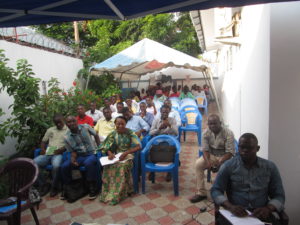 prosperity-and-miracles preacher from the US named Branham. He taught the Africans that he is the resurrection of John the Baptist and he has the true, hidden teaching with regard to Revelation and lots of nonsense. It is almost a national religion here. They bilk the poor Congolese out of their hard-earned money selling tapes and tracts. The young disciples are looking for ways to bring people out of this false belief but then need biblical tools to do so. Hopefully my visit will be of help. In the evening I teach a class on the Reliability of the Bible for the Marrieds group in the evening. About forty attend. The class goes for two and a half hours, but they still want more. It is hard to explain the hunger for Bible knowledge here. Who will come and meet the need?
prosperity-and-miracles preacher from the US named Branham. He taught the Africans that he is the resurrection of John the Baptist and he has the true, hidden teaching with regard to Revelation and lots of nonsense. It is almost a national religion here. They bilk the poor Congolese out of their hard-earned money selling tapes and tracts. The young disciples are looking for ways to bring people out of this false belief but then need biblical tools to do so. Hopefully my visit will be of help. In the evening I teach a class on the Reliability of the Bible for the Marrieds group in the evening. About forty attend. The class goes for two and a half hours, but they still want more. It is hard to explain the hunger for Bible knowledge here. Who will come and meet the need?
Married group in Brazzaville
Wednesday I still do not have my luggage. It is starting to be a problem, as I do not have my malaria medicine and wearing the same clothes for a third day is questionable. I spend time with four of the Christians here who are considering going into the ministry, Freeway, Reddy, Dosmitsh and Nell. The evening is midweek service for the church, with a class on the Holy Spirit. There are many false practices regarding gifts here and the members of the church have many questions in this area. There are about 300 in attendance, which is really good if you consider this is a midweek and there are 295 members. Most churches would be very happy with this level of commitment. Late at night, I finally have my luggage, just it time to travel to Pointe Noire.
Pointe Noire, Jan 16-20.
The flight to Pointe Noire is quite short—just over a half hour. This is the second city of RC, with a population a bit under one million. Actually, this and Brazzaville are the only two cities. The rest are really only villages. Pointe Noire is the business capital. This is where the industry is; especially the oil industry, which is the principle source of foreign revenue. Pointe Noire is on the Atlantic Ocean.
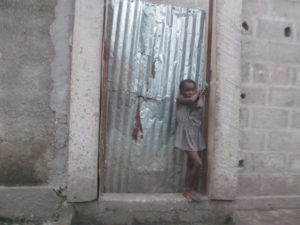 A curious child in Pointe Noire.
A curious child in Pointe Noire.
The church here is about 360 members, and are led by Oclave and Robine Mokamba. The composition is very different from Brazzaville as there are virtually no university students for the simple reason that there is no university here. The majority are marrieds. The streets here are narrower and the traffic is like the rest of Africa—quite bad. As far as I know I am the first non-African to come here from outside to teach or preach, despite the fact that the church has been here for 18 years. Please, please consider coming here some time to encourage the church. You would be received with almost overwhelming gratitude.
Thursday evening is a midweek service. I teach on the Holy Spirit to nearly three hundred. During and after service there are torrential downpours. The members have to find their way home through very deep water on the streets, finding their way to buses which may not even be running to get home from the meeting. In my nice comfortable car I see people walking through thigh-deep water to cross the streets. I can hardly relate to the level of commitment to God and to the body this requires.
With the marrieds in Pointe Noire.
On Friday we drive outside the city, to the north to a beautiful gorge which overlooks the ocean. We drive through roads heavily damaged by the flooding just yesterday. I love the countryside here. The people live a very simple life, yet they seem happy. In the evening I teach a class on Acts for the leadership group—about sixty. Saturday I teach all day. From 10:00-1:00 on Daniel for the singles. There are about 160 singles in the church here–almost half the church. Then from 3:00-6:00 for the marrieds on the question of suffering. Questions and answers go on for well over an hour and could have extended much more. They are so hungry to have their questions about the Bible and basic Christian living answered. In the evening we have a wonderful diner of Congolese food at the home of Robine and Oclave, including cassava root and leaves, fish, beans, rice, plantains, kidney stew (which tasted great—honest) and much more. It is so great spending time with my church family, even though so few speak English.
Sunday morning is church, of course, So many are in attendance that they set up a canopy in front of the building, right in the middle of the road! At least 50 were under this canopy. The singing was out of this world, and the enthusiasm was electric. After preaching on Hebrews 11 I am whisked off to the airport to fly to Lusaka.
Lusaka, Zambia Jan 21-26
The flight to Lusaka is from Pointe Noire, to Brazzaville, to Kinshasa to Nairobi to Lusaka. You can imagine how much of an ordeal that was. This is a city of three million in a country of 14 million. It is not a terribly crowded country, as it is larger than Texas. The chief language here is English. There are more than seventy languages, but the four most common native languages are official. Given this variety, in fact English is the language of Zambia. For me, this is a great relief because for the past twelve days, I have hardly been able to speak, as almost no one I met, in church or in other settings, spoke English. Zambia is in southern Africa, south of Congo, northwest of Zimbabwe. It is a poor country but there is a stable democracy and corruption is much lower than other parts of the continent, making this a very pleasant country to visit or to live in. It is cooler here, even though it is so close to the equator because of the elevation. With Victoria falls and the huge game parks, this is a favorite tourist destination.
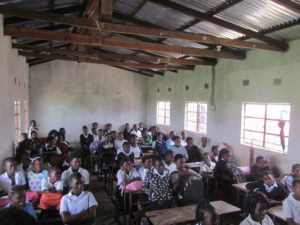 Girls in HOPE after-school class
Girls in HOPE after-school class
I am met by Twaambo Chikoye. He is a single guy who has been leading the church of 115 here. I know him from meeting at a singles conference last September in Phoenix. The church is mostly marrieds, making his job hard. Fortunately, a couple from Nairobi, John and Jane Maleya have just moved here two weeks ago to help take on the load of leading this group. I am staying in the home of Simon and Katrina. On Tuesday I get to visit sites for HOPE Worldwide here. They have programs for AIDS orphans and their grandmothers, after-school education for girls, nutrition programs for the vulnerable, micro loan programs for women in the poorest areas, seeds for farmers and much more. Wednesday I teach for a midweek service of half the church from Malachi. I also had lunch with a man named Elias who tells me he is a politician. I ask him what office he holds. He tells me that, actually, he is running for president of the country. How interesting is that. I do not know another in our fellowship doing such a thing.
Thursday I get to visit a game preserve and even “walk” a cheetah before speaking to the other half of the church in the evening. The church here in Zambia are so different from in Western or Central Africa. They are much more “British” here. They are so polite and very quiet in church except when singing. It reminds me of England. The church here is fairly mature, with many families having teen and even adult children. Friday I teach the Bible group leaders on Freedom in Christ and Acts 20. About 25 leaders come to the classes. Saturday is a class for the church. John expected fifty, but seventy showed up for a three hour session on the Book of Acts. The desire to take it deeper with God in the church here is really obvious.

